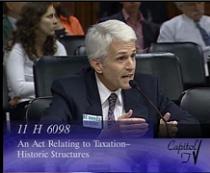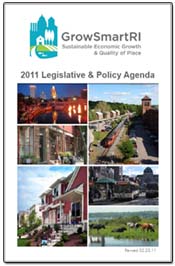
Making the Case for Targeted Investments
Grow Smart Executive Director Scott Wolf seen testifying before the House Finance Committee on June 7, 2011 in support of restoring a more targeted State Historic Tax Credit to encourage smart economic development and the adaptive reuse of Rhode Island's rich stock of underutilized historic buildings.
|
|
|
2011 Legislative & Policy Agenda

Grow Smart Rhode IslandBoard of
Directors
Howard M. Kilguss
Chairman of the Board
Susan Arnold
William Baldwin
Daniel A. Baudouin
Samuel J. Bradner
Kenneth Burnett
Joseph Caffey
Kathleen Connell
Gib Conover
Jen Cookke
Trudy Coxe
Kristin A. DeKuiper
Dennis DiPrete
Dr. David Dooley
Stephen Durkee
Stephen J. Farrell
Michael L. Friedman
Wilfred L. Gates
Akhil C. Gupta
Junior Jabbie
Stanley J. Kanter
Jason E. Kelly
Basil Lee
Stephen M. Maiorisi
Kelly Nickson Morris
Donald W. Powers
John A. Rupp
Richard Schartner
Lucie G. Searle
Deming E. Sherman
Pamela M. Sherrill
Julia Anne M. Slom
Jonathan F. Stone
Martha L. Werenfels
Directors Emeritus
Arnold "Buff" Chace
Louise Durfee, Esq.
J. Joseph Garrahy
Michael S. Hudner
Michael F. Ryan
W. Edward Wood
Board Listing with
Affiliation

Staff
Scott
Wolf
Executive Director
Sheila
Brush
Director of Programs
John
Flaherty
Director of Research &
Communications
Leslie
Denomme
Executive Assistant for Finance
Dorothy
Dauray
Office Assistant
Lauren
Pendergast
Training Coordinator

|
|
| |
John,
You're among the 3,567 civic leaders,
state & local officials, development professionals,
investors, decision-makers and visionary citizens getting the latest news, happenings and trends in the local smart growth movement. We're Grow Smart
Rhode Island. Partner with us. Support us with a tax deductible contribution. Let's make Rhode Island a better place together by playing to our strengths.
|
| |
| |
|
| Austerity trumps prosperity agenda in 2011 General Assembly |
| |

Rhode Island lawmakers adjourned for the year at 1:15 AM on Friday, July 1, 2011. The following are highlights of bills that impact community & economic development and quality of place in Rhode Island.
In this just completed session of the General Assembly, legislators worked diligently to pass a budget that avoids significant tax increases and achieves a high level of fiscal austerity.
But the question that all Rhode Islanders need to ask now is whether austerity alone is enough to turn our State around? We at Grow Smart maintain that a creative long range prosperity agenda is also needed for Rhode Island to overcome its economic sluggishness and come closer to reaching its full potential.
That's why we pursued initiatives in this Assembly session to restore a more targeted State Historic Tax Credit, to begin increasing comprehensive transportation investments through modest increases in user fees and to provide new incentives for municipal officials to encourage economic development in our urban, town and village centers. Unfortunately, none of these measures passed, although we appreciate the fact that hearings were held on all of them and that legislators such as Representative Jay O'Grady championed each one. There also was important coalition building accomplished on behalf of each of these measures, a development that bodes well for their chances of passage either later this year or next year.
Fortunately some other important bills we backed did get Assembly approval including a proposal to reform and update the local comprehensive planning system, and a measure to give communities more flexibility to create special zoning districts that encourage mixed use development and additional investment in our urban, town and village centers.
More
|
| |
|
| |
| Economic Growth & Revitalization |
| |
 Historic Tax Credit Historic Tax Credit
( H-6098)
The House Finance Committee conducted a hearing on June 7, 2011 on this bill to restore a more targeted version of the State Historic Tax Credit program. After the hearing the Committee held the bill for further study. Key elements of organized labor expressed concerns about the bill at the hearing but later got behind it when proponents, including Grow Smart RI, agreed to an amendment requiring larger projects (those with "hard" construction costs of at least $ 6 million) to pay at least 80% of prevailing wages and fringe benefits to all project subcontractors. We hope that a bill with this new language and expanded coalition can pass the Assembly either later this year or early next year.
 [Failed]
[Failed]
 Amendment of Zoning Enabling Act
Amendment of Zoning Enabling Act
( H-5553 / S-306)
This act expands the definition of "Overlay Districts" to allow standards and requirements for Overlay Districts to be either more restrictive or less restrictive than underlying zoning. The ability to create an overlay district with less restrictive standards provides another effective planning tool for communities, especially in efforts to advance revitalized and mixed-use urban, town and village centers.
 [Passed]
[Passed]
 Local Economic Development Incentive proposal Local Economic Development Incentive proposal
( H-5496)
This act would have provided an incentive (and a means) for municipalities to encourage growth in urban and town centers by amending the property tax levy cap. The bill was heard by the House Finance Committee on 3/9 and had the support of the City of Pawtucket and the Rhode Island League of Cities and Towns.
 [Failed]
[Failed]
 Amend Comprehensive Planning and Land Use Act Amend Comprehensive Planning and Land Use Act
( H-5380 / S-0021)
This act revises the Comprehensive Planning and Land Use Act, incorporating a number of changes that make the planning process more workable for communities. The act extends the minimum time between required plan updates from 5 to 10 years, provides for a preliminary review of draft plans by the Division of Planning prior to the municipality's initial public hearing on the plan, and provides that municipal appeals of the Division of Planning's decisions concerning a comprehensive plan will be heard by a Hearing Officer. It also clarifies that after adoption of a comprehensive plan amendment that requires a zoning ordinance amendment, the zoning ordinance in effect at the time the update is adopted will remain in effect until the ordinance is amended, and it provides that a community may establish a 12-month moratorium to provide interim protection for a planned future land use. The act also includes language that reflects current planning priorities in Rhode Island. For example, the description of the circulation and transportation section makes specific reference to transit and bikeways, the description of the economic development section makes specific reference to agriculture, and comp plans must now include a discussion of natural hazards such as sea level rise, flooding and drought.
 [Passed]
[Passed]
|
| |
|
| |
| Transportation Investment, Debt Reduction |
| |
 Transportation Investment & Debt Reduction Act Transportation Investment & Debt Reduction Act
A bill sponsored in both chambers of the legislature this year and supported by the Coalition for Transportation Choices provided an opportunity for Rhode Island to take bold but economically sound steps to help reduce reliance upon a shrinking and increasingly unpredictable revenue source - the flat per gallon gas tax. Some elements of this bill, such as establishing a new Transportation Trust Fund to help reduce state borrowing and bonding through pay-as-you-go revenue sources, were incorporated into the state budget, with language taken directly from the proposed Transportation Investment and Debt Reduction Act. But legislators left out several other key elements of the bill, including a provision allocating a portion of Trust Fund receipts to mass transit. Through this omission the enacted budget fails to fully recognize that transportation is more than just cars, roads and bridges. Mass transit is a much more vital part of Rhode Island's economy than many people think. Seventy percent of riders take RIPTA to work, so forcing RIPTA to make deep service cuts is a false economy and will become yet another barrier between people and jobs - particularly for those working second shift. Another element left out of the budget was an allocation of new revenues to cities and towns for fixing local roads. Instead of balancing new transportation investments from increased license and registration fees, the budget measure that passed will provide funds solely to the Department of Transportation.

[Failed]
 An Act Related to Motor Fuel Tax An Act Related to Motor Fuel Tax
Through its leadership role in the CTC, Grow Smart opposed this legislation to reduce the Motor Fuel Tax by 5¢ per gallon. Declining gas tax receipts are already producing less and less revenue to sustain roads, bridges and transit. This would have been a move in the wrong direction for Rhode Island.
 [Failed]
[Failed]
 Resolution Regarding Incentives to Increase Bus Ridership and Reduce Single Occupancy Commuting by State Employees Resolution Regarding Incentives to Increase Bus Ridership and Reduce Single Occupancy Commuting by State Employees
To finish the work of the 2008 General Assembly ( H-7377), this Resolution requests that the Department of Administration complete its report and recommendations regarding incentives to encourage more state employees to use alternate means of commuting to work, including an incentive for using mass transit.
 [Passed]
[Passed]
|
| |
|
| |
| Housing Options and Affordability |
| |
 Fully fund the Neighborhood Opportunities Program (NOP) Fully fund the Neighborhood Opportunities Program (NOP)
( H-5913 / S-571) The General Assembly accepted Governor Chafee's budget recommendation not to provide any state funding for NOP but to require that the quasi-public state housing finance agency, Rhode Island Housing, take $ 1.5 million from its own resources for NOP program funding. NOP is the only long term state funded program for affordable housing other than the nearly depleted proceeds from the 2006 State Housing Bond. NOP is especially important in hard economic times because it concentrates on those Rhode Islanders who are homeless or in greatest danger of becoming homeless.
[Failed]
|
| |
|
| |
| Agriculture Viability & Profitability |
| |
 Resolution for recommendations to strengthen agriculture Resolution for recommendations to strengthen agriculture
This House Resolution requests that RIDEM, RIDOH, RIEDC and the Division of Planning work with the RI Agricultural Partnership and other agricultural interests, non-profit entities, municipalities, academic institutions, and the planning community
to review current state laws related to agriculture and submit recommendations to the General Assembly for amendments designed to establish policies and programs conducive to expanded food production and to the sustainability and expansion of agricultural operations in Rhode Island.
[Passed]
|
| |
|
| |
| Power of Place Summit |
| |

Mark your calendar
Grow Smart's 4th biennial Power of Place Summit will take place at the Rhode Island Convention Center on:
Friday, May 11, 2012
Details on partnership opportunities, call for workshop proposals, etc. coming soon.
|
| |
|
| |
|